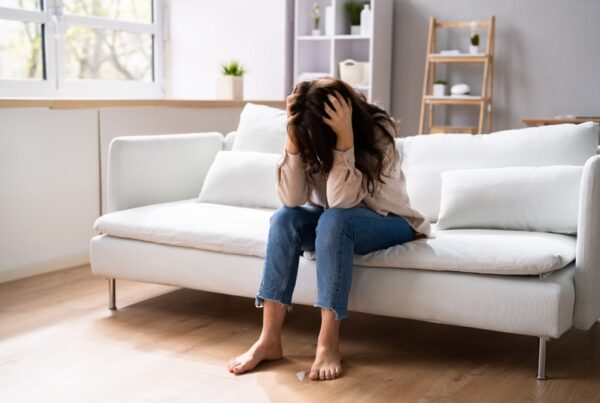The Oxford English Dictionary defines anxiety as “a feeling of worry, nervousness, or unease, typically about an imminent event or something with an uncertain outcome.” Anxiety can have a significant impact on your sleep quality. Research suggests that anxiety may lead to a state of dysfunctional arousal which often results in persistent sleep-wake difficulties. Insomnia is characterized by “the subjective complaint of difficulty falling or maintaining sleep, or nonrestorative sleep, producing significant daytime symptoms including difficulty concentrating and mood disturbances.” Insomnia, and other serious disturbances of sleep, are well established as a common symptom of anxiety disorders, because people’s worries disrupt their ability to sleep well. Coping with anxiety-related insomnia can be challenging, but there are several strategies and techniques that can help you manage your anxiety and improve your sleep quality, such as:
- Avoid an erratic sleep schedule: Develop consistent sleep patterns by having a set bedtime and following it every day, as best as you can.
- Exercise daily: Integrating regular exercise into your routine not only helps with releasing endorphins (the hormones in one’s body associated with feeling pleasure) but can also increase the production of melatonin (the body’s main sleep-inducing hormone).
- Eat smaller meals in the evening: Eating a large dinner can interfere with your ability to fall asleep, as your body must work extra hard to digest a heavy load. Decreasing portion sizes and switching your larger meal of the day to lunchtime can help you reduce your digestive load in the evenings, which can help you fall asleep more naturally.
- Create a peaceful sleeping environment: Research has found that the body naturally produces certain chemicals to help increase feelings of calmness and relaxation. When serotonin, known as the “feel-good” hormone, is released in a comfortable and/ or dark environment it is converted into melatonin.
- Refrain from using electronics at bedtime: One study found that individuals who refrained from using their smart phones and other screen-based devices an hour before bed gained twenty-one extra minutes of sleep at night.
- Try a weighted blanket: The purpose of weighted blankets is to put additional pressure on an individual’s body while they rest to help generate deep relaxation. The weight of the blanket works by stimulating the deep pressure touch (DPT) receptors of the body, triggering the release of serotonin. This, in turn, helps people achieve more meaningful rest by helping them fall asleep, and remain asleep longer.
Overcoming anxiety-related insomnia does not happen instantaneously, rather it is a process that requires time and patience. If, however, you find that your insomnia is significantly affecting your quality of life, it is advised to seek professional guidance.
Treatment In Calabasas
Calabasas is a city in California. It is a well-known suburb of Los Angeles, located west of the San Fernando Valley and north of the Santa Monica Mountains. Over the past decade, the city of Calabasas has grown in its reputation for luxury as well as for privacy which makes it a hidden gem for residential living for society’s elite, and one of the most desirable destinations in Los Angeles County. It is also home to a plethora of highly qualified mental health clinicians providing an array of therapeutic services and treatment options.
The information above is provided for the use of informational purposes only. The above content is not to be substituted for professional advice, diagnosis, or treatment, as in no way is it intended as an attempt to practice medicine, give specific medical advice, including, without limitation, advice concerning the topic of mental health. As such, please do not use any material provided above to disregard professional advice or delay seeking treatment.




